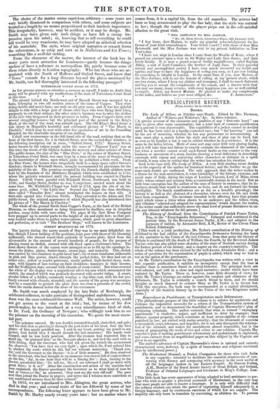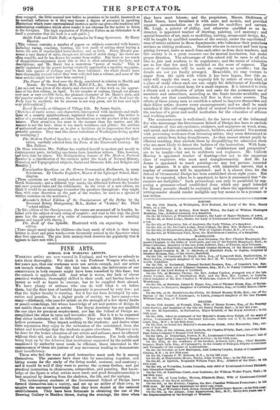PUBLICATIONS RECEIVED.
From October 3d to October 9th.
BOOKS.
The Lady of Milan; or Fidelity unto Death. Edited by Mrs. Thomson, Author of 'Widows and Widowers," &e. In three volumes.
[A precise account of the character and qualities of any "first-rate hand" can only be given after some examination; but a total lack of common qualification for a pursuit is soon discoverable. The capabilities of a jockey cannot be decided until -he has been tried in a hardly-contested race; but the knowing" can tell by the act of mounting whether he has any pretensions to horsemanship. A man must play a match before his style and class of play can be fixed, but as soon as he handles a bat it can be settled whether he is a cricketer. It is the same in the belles lettres. Merit of some sort may exist with very glaring faults, and it will take time and labour to exactly estimate the character of the author; but when a novelist cannot avoid such formal faults as run counter to the very business or movement of a story, besides showing a total deficiency in describing externals with vigour and conceiving either characters or dialogue in a spirit of truth, it may soon be settled that the writer has mistaken his vocation. Such is the case with The Lady of Milan. A very little reading raises doubts as to the capacity of the author for historical fiction; and the further we go the more such doubts are confirmed. The only approach that the writer makes to a fitness for the task undertaken, is some knowledge of the history, customs, and social state of Italy, during the reign of Luchino Visconti, Lord of Milan circa 1340; whose crimes and tyranny form a considerable feature in the novel. But so little true conception has the author of the uses of history in romance that he in- troduces details that would be wearisome as facts, and do not forward the fiction intelligibly. The family ramifications are as dry as a herald's genealogy; the history is as dull as the abstract of a chronicler, whence even his life and truth have been evaporated. The incidents intended to be affecting have that prosaic spirit which raises a titter when shown to an audience; and the follies' vices, and villanies "selected and adapted for representation," would disgust the reader, if the writer could rise sufficiently above the dead level of prosaic literalness to ex- cite any interest whatever for his persons.]
The History of Scotland; from the Contribution of Patrick Fraser Tytler, Esq., to the Encyclopcedia Britannica." Enlarged and continued to the present time, by the Reverend James Taylor, A.M.; and adapted to the purposes of tuition, by Alexander Reid, A.M., Rector of the Circus Place School, Edinburgh.
[This work is a joint production; Mr. Tytler's contribution of the History of Scotland to the last edition of the Encyclopredia Britannica forming the basis of the narrative to the Union of the two Crowns: from that point the history of Britain is continued till the death of William the Fourth, by the Reverend James Taylor; who has also added some sketches of the state of Scottish society during the former periods of the history, and a chapter on the country's statistics. The whole of the volume has been revised by the well-known Alexander Reid ; and a series of questions for the examination of pupils is added, which may be had or not at the option of the purchasers.
As Mr. Tytler's contribution for the Encyclopsedia was written with a view to this separate publication, it exhibits no incongruity except that the tone is. manlier than is sometimes found in school-histories. The principal facts are well-selected, and told in a clear and rapid narrative; merits which have been imitated by Mr. Taylor. There is, however, some little diversity of view; for while Mr. fytler's leanings are rather against the conduct and character of the Reformers, Mr. Taylor is evidently a stanch friend to them, and we should imagine as much disposed to censure Mary as Mr. Tytler is to favour her. With this exception the book may be recommended as a capital abridgment, especially of the Scottish history up to the Union of the two Kingdoms under Anne.]
Benevolence in Punishment; or Transportation made Reformatory. [The philanthropic purpose of this little volume is to enforce by arguments and evidence the imperative necessity for a reform of the Transportation system of punishment, and to demonstrate the feasibility of Captain Maconochie's plan of reclaiming criminals. The author contends that what is termed "exemplary punishment" is vindictive, unjust, and inefficient to deter by example; that offences against property, which constitute at least seven-eighths of the crimes punished by law, are visited with undue severity ; that the treatment of convicts is tyrannical, cruel, inhuman, and impolitic, for it not only disregards the reforma- tion of the criminal, and makes his amendment almost impossible, but is the means of propagating the seeds of vice and crime in our colonies. Captain Ma- conochie's plan of making punishment reformatory and probationary is explained; and some extracts from an unpublished paper on this subject by the Captain are given in an appendix. The author's advocacy of Captain Maconoehie's views is rational and earnest; characterized more' however, by a spirit of benevolence and religions sentiment than by intellectual power.]
The Hindustani Manual; a Pocket Companion for those who visit India
in any capacity; intended to facilitate the essential attainments of con- versing with fluency and composing with accuracy in the most useful of all the languages spoken in our Eastern Empire. By Duncan Forbes, AM., Member of the Royal Asiatic Society of Great Britain and Ireland, Professor of Oriental Languages and Literature in Kin* g's College, Lon- don, &c. [This little book has every appearance of being adapted to lend assistance to per- sons who wish to acquire a practical command of Hindustani, in the only way that most people are able to master a language. It is only with difficulty that the solitary student can attain the power of expressing himself adequately in a foreign language, and by continuous exertions of which few are capable. The majority can only learn to translate by conversing, as children do. To persons
thus engaged, the little manual now before us promises to be useful, inasmuch as le constant reference to it they may insure a degree of accuracy in speaking :dostani which mere conversational exercises never can give—the readiness and unhesitating confidence which alone render it not irksome for the native to listen to the foreigner. The high reputation of Professor Forbes as an Orientalist is of, itself a guarantee that his book is a safe guide.]
Stable Talk and Table Talk; or Spectacles for Young Sportsmen. By Harry Theover.
[This volume contains a number of papers on subjects connected with horses; including racing, coaching, hunting, the best mode of setting about buying a horse, the arts of unprincipled horse-dealers, and so forth. Harry Hieover pos- sesses a racy fluency of stele, though not divested of stable slang; his views are often sensible, and he has drawn his matter from reality. But there is too much of disquisition—argument about this or that is often substituted for facts and descriptions; and iMr. Harry has a monstrous "power of words." This is partly explained by the papers having originally appeared in a sporting magazine,
where this species of verbiage may be more tolerated: the whole should have been thoroughly revised before they were collected into a volume, and some of the /sitar articles might better have been omitted.]
The Power of the Sod over the Body, considered in relation to Health and Morals. By George Moore, M.D., KILC.P.L., Sec. Second edition. [An account was given of the objects and character of this work on the appear- ance of the first edition, in ApriL To the number of curious, though not always very new or very credible facts, the pleasant character of Dr. hIoore's style, and the popular nature of his views, the success of The Power of the Soul over the Body may be ascribed; for its acumen is net very great, nor its tone and style very philosophical.] Rural Records; or Glimpses of Village Life. By James Smith. [Sketches of rustic scenes and characters, interspersed with incidents and tradi- twos of a country neighbourhood; reprinted from a magazine. The writer is editor of a_provincial journal, and these lucubrations are the product of his scanty leisure. Their attraction lies more in the manner than the matter, and the manner is not the best: there is too much wordiness and glitter; the artifices of authorcraft are so obvious as to give a factitious air to impressions that were probably genuine. They read like clever imitations of Washington Irving spoiled 157 overlaying.] The Modern Poetical Speaker; or a Collection of Pieces adapted for Reci- tation, carefully selected from the Poets of the Nineteenth Century. By Mrs. Palliser.
[In these selections Mrs. Palliser has confined herself to modern and mostly to contemporary poets, including specimens from American writers. This, however, had been done by others. The distinguishing feature of The Modern Poetical Speaker is a classification of the extracts under the heads of Natural History, Historical and Topographical subjects, Social and Domestic Life, and Religion and Morality.] Examination Questions on the Grtscce Grammatime Rudimenta, in usum Seholarum. By Charles Engledow, Master of the Episcopal School, Had- dington. These questions are well enough selected to test the pupil's proficiency in the Rudiments; and a different type marks the difference between the broader and more general rules and the refinements. In the event of a new edition, we
think it would be an advantage to number the questions throughout: they might then with some discretion on the part of the teacher, be used as a species of written exercises on the accidence.]
Maunder's School Edition of the Omnipresence of the Deity; by the Reverend Robert Montgomery, MA., Author of "Luther," &e. Third "school edition."
[In this edition of the Omnipresence, the verses are measured off in lengths, la- belled with the subject of each string of couplets: and read in this way, the great poem has the appearance of a centsof commonplaces expressed in sounding phrase and tagged with rhyme.]
The Book of One Syllable. Illustrated with six engravings. Second edition.
[These simple moral tales for children—the least merit of which is their being written in short and plain words—were favourably noticed in the Spectator when they first appeared. The nice little nursery-book deserves the popularity that it lippears to laave met. with.1



























 Previous page
Previous page